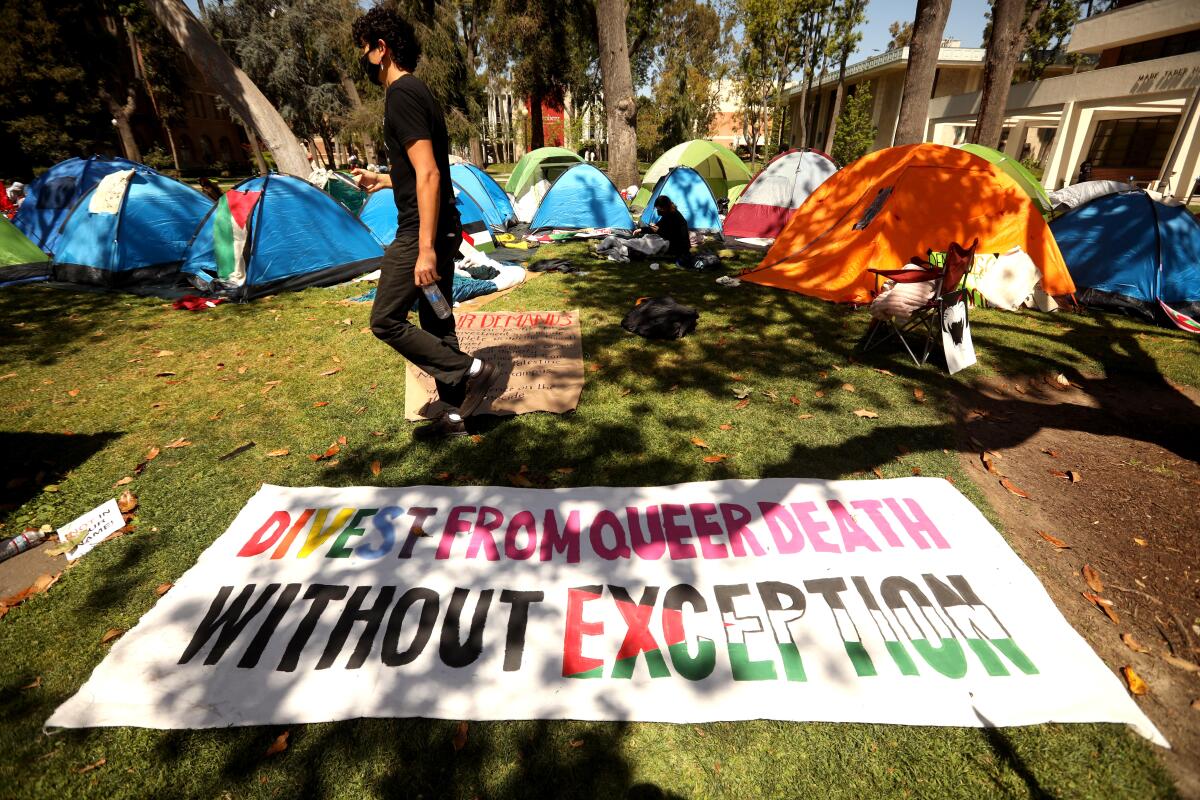
To the editor: David N. Myers and Nomi M. Stolzenberg are trying to determine what makes make a campus protest antisemitic. (“Can legitimate campus protest be distinguished from antisemitism? This guide aims to help,” Opinion, Sept. 16)
Their definition reminds me of the Harvard president who, when asked if calling for the genocide of Jews violated the university’s student code of conduct, told a congressional committee that it “depends on the context.” She was later forced to resign.
Stolzenberg and Myers say that shouting “from the river to the sea” may not be antisemitic if what the protesters mean is creating one state of Palestinians and Jews.
There are dozens of Muslim countries. There is one Jewish nation. Eliminating the one Jewish nation and replacing it with a Muslim-Jewish nation is not prejudicial against Jews, we are to believe.
They claim that shouting “intifada” may not be antisemitic. The only way that term is ever used is to support a violent uprising resulting in the killing of a large number of people they oppose.
Jerry Freedman, Los Angeles
..
To the editor: I applaud Myers’ and Stolzenberg’s nuanced distinction between acceptable debate and unacceptable bigotry. But their analysis fails to condemn the weaponization of antisemitism as a defense against, or distraction from, any legitimate criticism of the Israeli occupation of Palestinian territory.
Protesting Israel’s bloody and relentless siege of Gaza can be easily distinguished from expressions of antisemitism. The reality is that those currently defending the apartheid policies of a demonstrably bigoted Israeli regime realize there is no justification for those flawed, discriminatory policies, so they resort to accusations of antisemitism.
The authors refer to a guide helps identify antisemitism. If we are to apply the criteria to the campus protests, there are very few examples of any violation of these guidelines. But, as we’ve seen, the pro-Israel faction has categorically condemned the use of certain protest slogans that, as the authors acknowledge, are not necessarily antisemitic.
Rather, the rhetoric used to describe the apartheid conditions flowing from the occupation, including terms such as “intifada” and “genocide,” constitutes a reasonable criticism of Israel’s violation of Palestinian self-determination.
Andrew Spathis, Los Angeles
..
To the editor: The writers have the bona fides to understand historical context, yet they choose to ignore it without explanation.
“From the river to the sea,” in the minds of protesters, may be innocuous on its face, but how can anyone forget the original, chilling meaning? The original intent was the decimation of the state of Israel, especially as a haven for Jews ejected by their own countries, and by extension the elimination of Jews in the world.
The quote is definitively antisemitic and cannot be separated from its origins.
Suzan Lowitz, Los Angeles
..
To the editor: Myers’ and Stolzenberg’s argument contradicts many of the protections of both U.S. civil rights laws and international human rights laws.
Many of these laws are not dependent — as the authors incorrectly imply — on often impossible assessments of intent in determining prohibited discriminatory behaviors. Their definitions would potentially and harmfully allow for many forms of illegal intimidation and discrimination against individuals and groups.
Discriminatory outcomes matter profoundly in civil rights and human rights laws. The argument Myers and Stolzenberg make undermines the rights and welfare not only of Jews and Israelis, but of Muslims, Arabs, women, African Americans, LGBTQ+ people and other minority groups.
Myers and Stolzenberg are right that intent matters morally and legally. But it is not all that matters. Discriminatory outcomes are also fundamental concerns of both the law and of university campus codes.
Noam Schimmel, Berkeley
The writer is a lecturer in global studies at UC Berkeley.